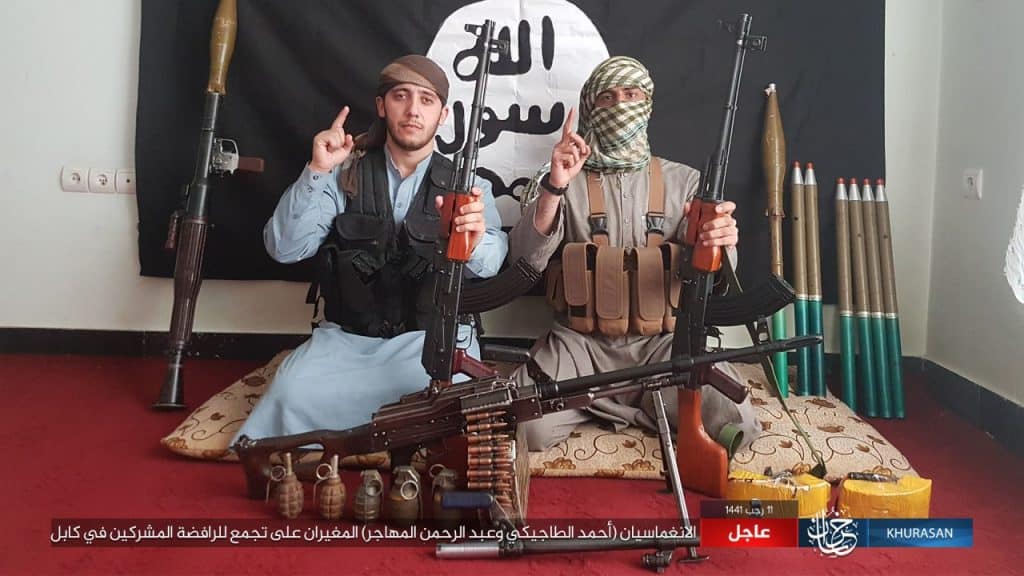
The Islamic State has claimed responsibility for yesterday’s assault on a memorial ceremony held in honor of Abdul Ali Mazari, an ethnic Hazara political leader who was killed by the Taliban in 1995. Dozens were killed or wounded when terrorists struck the proceedings with rockets and other small arms.
In statements and a photo, the Islamic State identified the two jihadists who were purportedly responsible as Ahmad al-Tajiki and Abdul Rahman al-Muhajir. Obviously, the first nom de guerre indicates that he is an ethnic Tajik, while the second means that the terrorist is a foreign fighter. In addition to the photo seen above, which was disseminated by the Islamic State’s media team, the group also produced a statement and a report by its Amaq News Agency.
Abdullah Abdullah, a political opposition leader, was in attendance when the raid started. He escaped, but at least 32 others perished, while more than 80 people were wounded.
The Islamic State attacked the same ceremony last year, killing at least three people and wounding approximately 19 more. The jihadists relied on mortars and rockets in that operation, claiming afterwards that their targets were “Rafidi mushirkin,” meaning Shiite polytheists. Abdullah Abdullah was speaking to the crowd when mortars fell during that barrage as well. [See FDD’s Long War Journal report, Islamic State launches mortars at memorial service in Kabul.]
The Islamic State focuses much of its terror in Afghanistan and elsewhere on Shiite civilians, hoping to stoke sectarian tensions to further fuel its Sunni jihad. The group’s statements on yesterday’s assault also referred to the Shiite victims in a derogatory manner.
The Taliban quickly denied responsibility. The Taliban, including the Haqqani Network, is quite capable of pulling off such raids, or even more devastating bombings and assaults on the Afghan capital. Currently, however, the group is waiting for America to withdraw more or all of its forces and is focusing its operations in more rural areas during the meantime.
Still, there is often some uncertainty regarding the identity of the culprits. While the Taliban and ISIS are currently at loggerheads, especially in eastern Afghanistan, Taliban commanders and fighters have defected to ISIS and vice versa.
The Islamic State also claimed responsibility for a smaller operation in Kabul on Feb. 27, when a bomb attached to a bicycle was detonated in the Sixth Police District. At least one civilian was killed, while ten or more were wounded. The jihadists said there were 30 Shiite casualties, though that seems to have been an exaggeration.
The Afghan arm of the so-called caliphate has undoubtedly suffered a string of setbacks at the hands of the U.S. and Afghan forces, as well as the Taliban. But there is ambiguity concerning the overall strength of the Islamic State’s Khorasan arm.
Afghan President Ashraf Ghani claimed earlier this year that the organization had been “obliterated” in eastern Afghanistan. But assuming the recent attack in Kabul was in fact the Islamic State’s work, then the group has maintained at least some residual capacity.
The Afghan Ministry of Interior Affairs claims that dozens of ISIS fighters surrendered to security forces in Kunar in recent days. It is not clear how many remain, as publicly available estimates vary.







